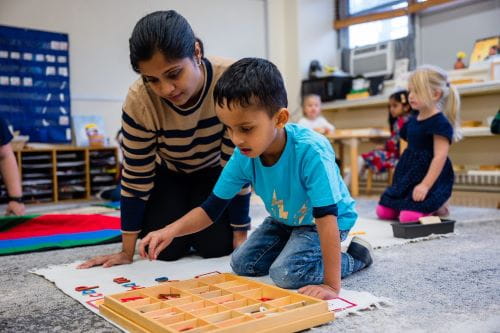Montessori measurement materials play a vital role in promoting comprehensive learning in young children
Montessori education focuses on providing children with hands-on learning experiences that promote comprehensive development. In the realm of mathematics, the Montessori method offers various materials to foster understanding of concepts such as counting, shapes, and measurements. In this article, we will explore the significance of Montessori measurement materials and how they enhance children’s learning.
The Importance of Measurement in Montessori Education
Measurement is a fundamental mathematical concept that allows children to make sense of the world around them. By engaging in measurement activities, children develop essential skills like comparing, estimating, and problem-solving. Montessori measurement materials provide children with concrete experiences that help them grasp abstract concepts related to measurement.
Beyond Counting and Shapes
While counting and shapes are crucial aspects of early math learning, the Montessori approach goes beyond these concepts to introduce children to measurement. By exploring dimensions such as length, width, height, weight, and volume, children gain a deeper understanding of the physical world.
The Montessori Measurement Materials
Montessori offers a range of measurement materials designed to engage children in hands-on activities that promote learning. Some of the commonly used measurement materials include:
1. Ruler
A ruler is a simple yet effective tool for measuring length. Montessori rulers are usually wooden and have clear markings, allowing children to practice measuring objects of different sizes.
2. Measuring Cups and Spoons
Children learn about capacity and volume by using various sizes of measuring cups and spoons. Montessori materials often include graduated containers that allow children to understand the concept of volume through pouring and filling.
3. Weighing Scale
A weighing scale helps children explore the concept of weight. Montessori weighing scales are typically balance scales that allow children to compare the weights of different objects and understand the concept of balance.
4. Thermometer
Introducing children to thermometers enables them to understand temperature and its measurement. They learn how temperature affects the state of matter and gain practical knowledge about hot and cold.
Benefits of Montessori Measurement Materials
The utilization of Montessori measurement materials provides numerous advantages for children’s development:
1. Hands-on Learning
The materials enable children to engage in hands-on activities, fostering a deep understanding of measurement concepts through direct experience.
2. Sensorial Exploration
Montessori measurement materials appeal to children’s senses, helping them develop spatial awareness, motor skills, and coordination.
3. Relevance to Everyday Life
Measurement is a skill that children can directly relate to everyday situations. By understanding measurement concepts, children are better prepared for practical tasks such as cooking, building, or organizing.
4. Holistic and Comprehensive Learning
Incorporating measurement materials into the Montessori curriculum ensures a well-rounded education by complementing counting and shapes with an understanding of the physical world and its dimensions.
Montessori measurement materials play a vital role in promoting comprehensive learning in young children. By providing hands-on activities and tangible experiences, these materials enable children to understand abstract measurement concepts. Consequently, children gain a deeper appreciation of the physical world, develop problem-solving skills, and enhance their mathematical abilities.
Nidhin
For More Details Call: +917510220582
